List of chancellors of Austria
The chancellor of Austria is the head of government of the Austrian Republic, appointed by the president and regarded as the country's de facto chief executive. The chancellor chairs and leads the Government, which also includes the vice-chancellor and the ministers.[1]
- Renner was the first Chancellor of German-Austria, the First Republic and the Second Republic
- Dollfuss turned the First Republic into a dictatorship and is a key figure of fascism
- Kurz was the world's youngest head of government during almost all of his incumbency
- Kreisky is known as one of the world's perhaps most successful socialist leaders
Following World War I, the office was originally established by the Provisional National Assembly on 30 October 1918 as state chancellor of the Republic of German-Austria, and its first holder, Karl Renner, was appointed by the State Council. After the Allies declined a union between Austria and Germany,[2] German-Austria established the First Austrian Republic and soon afterwards renamed the office from state chancellor to federal chancellor – the first federal chancellor was Michael Mayr. Ten chancellors served under the First Republic until Chancellor Engelbert Dollfuss established the authoritarian and dictatorial Federal State of Austria.[3] Following Dollfuss's Assassination by the Nazis,[4] Kurt Schuschnigg succeeded him as chancellor and upheld the dictatorship,[5] until he was superseded by Arthur Seyss-Inquart, who held the office for two days until Austria was annexed by Nazi Germany.[6]
Austria under National Socialism lost its initial system of government and was headed by Reichsstatthalter Arthur Seyss-Inquart (1938–1939), Reich Commissioner Josef Bürckel[7] (1939–1940) and Reichsstatthalter Baldur von Schirach[8] (1940–1945). In 1940, the country was renamed to Ostmark, completely lost autonomy and became a domestic component of Nazi Germany.[9][10] After the liberation of Vienna and the dissolution of Nazi Germany, Austria resumed its republican form of government.[11] However, the country remained under allied occupation until 1955[12] and thus both the President and Chancellor were subordinate to the Allied Control Council.
Since the establishment of the republic, the People's and the Social Democratic Party have largely dominated every aspect of politics. The People's Party/Christian Social Party chaired 19 governments and was the second largest force in eight other governments; the Social Democratic Party/Social Democratic Workers' Party chaired eleven governments and was the second largest force in five other governments. The following parties never had a chancellorship but were coalition partners in governments: the Greater German People's Party in five, the Freedom Party and the Landbund in four, the Alliance for the Future of Austria and the Communist Party in one.
If the chancellor dies, resigns or is otherwise incapable, the vice-chancellor automatically becomes acting chancellor, if the president has not already replaced the chancellor. If the vice-chancellor is unavailable, the other members of the government take over in order of seniority.[13] The unavailability of an elected chancellor does not automatically call for a new election. If the president in turn dies, resigns or is otherwise incapable, the chancellor becomes acting president, but only for twenty days; after this period presidential powers and responsibilities devolve upon the Presidium of the National Council.[14]
Bruno Kreisky was the longest serving chancellor with 4778 days in office and Arthur Seyss-Inquart was the shortest serving chancellor with 2 days in office.
Chancellors
| Party | Portrait | Name | Tenure | Election | Governing party or coalition | Appointer | |
|---|---|---|---|---|---|---|---|
| SDAPÖ |  |
Dr. Karl Renner 1870–1950 [lower-alpha 1][15][16][17] |
30 October 1918 – 7 July 1920 |
1919 | • SDAPÖ • CS • GDVP |  State Council[lower-alpha 2] | |
| CS | 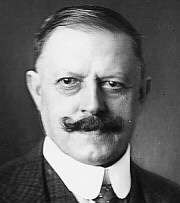 |
Dr. Michael Mayr 1864–1922 [lower-alpha 3][18] |
7 July 1920 – 21 June 1921 |
1920 | • CS • SDAPÖ | .jpg) Michael Hainisch | |
| IND |  |
Iur. DDDr. Johannes Schober 1874–1932 [19] |
21 June 1921 – 26 January 1922 |
– | • CS • GDVP • Experts | ||
| CS | Walter Breisky 1871–1944 [20] |
26 January 1922 – 27 January 1922 |
– | • CS • GDVP | |||
| IND |  |
Iur. DDDr. Johannes Schober 1874–1932 [21] |
27 January 1922 – 31 May 1922 |
– | • CS • GDVP • Experts | ||
| CS |  |
Dr. Ignaz Seipel 1876–1932 [22] |
31 May 1922 – 20 November 1924 |
1923 | • CS • GDVP • Experts | ||
| CS | 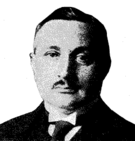 |
Dr. Rudolf Ramek 1881–1941 [23] |
20 November 1924 – 20 October 1926 |
– | • CS • GDVP | ||
| CS |  |
Dr. Ignaz Seipel 1876–1932 |
20 October 1926 – 4 May 1929 |
1927 | • CS • GDVP • Landbund | ||
| CS | .jpg) |
Ernst Streeruwitz 1874–1952 [24] |
4 May 1929 – 26 September 1929 |
– | • CS • Landbund |  Wilhelm Miklas | |
| IND |  |
Iur. DDDr. Johannes Schober 1874–1932 |
26 September 1929 – 30 September 1930 |
– | • CS | ||
| CS | .jpg) |
Carl Vaugoin 1873–1949 [25] |
30 September 1930 – 4 December 1930 |
– | • CS | ||
| CS | .jpg) |
Dr. Otto Ender 1873–1949 [26] |
4 December 1930 – 20 June 1931 |
1930 | • CS | ||
| CS | 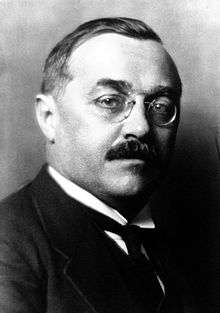 |
Dr. Karl Buresch 1873–1949 [27] |
20 June 1931 – 20 May 1932 |
– | • CS • Landbund | ||
| CS |  |
Dr. Engelbert Dollfuss 1892–1934 [28] |
20 May 1932 – 25 July 1934 |
– | • CS • Landbund • Heimwehr 20 May 1932 – 1 May 1934 • VF 1 May 1934 – 25 July 1934 | ||
| VF | |||||||
| VF |  |
Dr. Kurt Schuschnigg 1897–1977 [29] |
25 July 1934 – 29 July 1934 |
– | • VF | ||
| 29 July 1934 – 11 March 1938 | |||||||
| NSDAP | .jpg) |
Dr. Arthur Seyss-Inquart 1892–1946 [30] |
11 March 1938 – 13 March 1938 |
– | • NSDAP | ||
|
Austria part of Nazi Germany from 12 March 1938 to 13 April 1945 | |||||||
| SPÖ |  |
Dr. Karl Renner 1870–1950 [31][32][33] |
27 April 1945 – 20 December 1945 |
– | • SPÖ • ÖVP • KPÖ | [lower-alpha 4] | |
| ÖVP |  |
Dipl.-Ing. DDDr. Leopold Figl 1902–1965 [34] |
20 December 1945 – 2 April 1953 |
1945 | • ÖVP • SPÖ |  Karl Renner | |
| 1949 | |||||||
| ÖVP |  |
Ing. DDDr. Julius Raab 1891–1964 [35] |
2 April 1953 – 11 April 1961 |
1953 | • ÖVP • SPÖ | .jpg) Theodor Körner | |
| 1956 | |||||||
| 1959 | |||||||
| ÖVP |  |
Dr. Alfons Gorbach 1898–1972 [36] |
11 April 1961 – 2 April 1964 |
1962 | • ÖVP • SPÖ |  Adolf Schärf | |
| ÖVP |  |
Dr. Josef Klaus 1910–2001 [37] |
2 April 1964 – 21 April 1970 |
– | • ÖVP • SPÖ | ||
| 1966 | • ÖVP | ||||||
| SPÖ | .jpg) |
Dr. Bruno Kreisky 1911–1990 [38] |
21 April 1970 – 24 May 1983 |
1970 | • SPÖ | 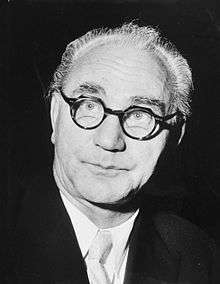 Franz Jonas | |
| 1971 | |||||||
| 1975 | |||||||
| 1979 | |||||||
| SPÖ | 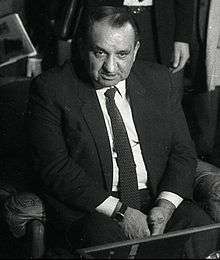 |
Dr. Fred Sinowatz 1929–2008 [39] |
24 May 1983 – 16 June 1986 |
1983 | • SPÖ • FPÖ |  Rudolf Kirchschläger | |
| SPÖ | _(cropped).jpg) |
Dipl.-Kfm. Dr. Franz Vranitzky born 1937 [40] |
16 June 1986 – 28 January 1997 |
1986 | • SPÖ • FPÖ | ||
| 1990 | • SPÖ • ÖVP | ||||||
| 1994 | |||||||
| 1995 | |||||||
| SPÖ | Mag. Viktor Klima born 1947 [41] |
28 January 1997 – 4 February 2000 |
– | • SPÖ • ÖVP | 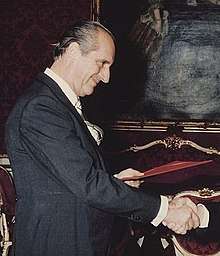 Thomas Klestil | ||
| ÖVP |  |
Dr. Wolfgang Schüssel born 1945 [42] |
4 February 2000 – 11 January 2007 |
1999 | • ÖVP • FPÖ 4 February 2000 – 3 April 2005 • ÖVP • BZÖ 3 April 2005 – 11 January 2007 | ||
| 2002 | |||||||
| SPÖ | .jpg) |
Dr. Alfred Gusenbauer born 1960 [43] |
11 January 2007 – 2 December 2008 |
2006 | • SPÖ • ÖVP | 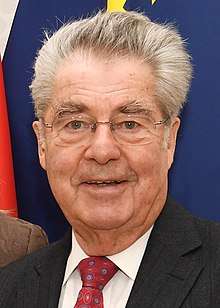 Heinz Fischer | |
| SPÖ | .jpg) |
Werner Faymann born 1960 [44] |
2 December 2008 – 9 May 2016 |
2008 | • SPÖ • ÖVP | ||
| 2013 | |||||||
| ÖVP | .jpg) |
Dr. Reinhold Mitterlehner born 1955 [45][46] |
9 May 2016 – 17 May 2016 |
– | • SPÖ • ÖVP | ||
| SPÖ | .jpg) |
Mag. Christian Kern born 1966 [47] |
17 May 2016 – 18 December 2017 |
– | • SPÖ • ÖVP | ||
| ÖVP | _(cropped).jpg) |
Sebastian Kurz born 1986 [48] |
18 December 2017 – 28 May 2019 |
2017 | • ÖVP • FPÖ 18 December 2017 – 22 May 2019 • ÖVP 22 May 2019 – 28 May 2019 |
.jpg) Alexander Van der Bellen | |
| ÖVP | _(cropped).jpg) |
Hartwig Löger born 1965 [49][50] |
28 May 2019 – 3 June 2019 |
– | • ÖVP | ||
| IND | _(cropped).jpg) |
Dr. Brigitte Bierlein born 1949 [51][52] |
3 June 2019 – 7 January 2020 |
– | Independent | ||
| ÖVP | _(cropped)_(cropped).jpg) |
Sebastian Kurz born 1986 [53] |
7 January 2020 – Present |
2019 | • ÖVP • Greens | ||
Statistics
The median age at which a chancellor first takes office is 50 years and 134 days (the age at which Christian Kern became chancellor). The youngest person to ever assume the office is Sebastian Kurz, who took office at the age of 31 years, 113 days. The oldest person to become chancellor for the first time is the incumbent Brigitte Bierlein at the age of 69 years, 343 days. Karl Renner served two nonconsecutive terms; at the beginning of his second term he was 74 years, 134 days old.
The oldest living former chancellor is Franz Vranitzky, born 4 October 1937 (aged 82 years, 318 days). The youngest living former chancellor is Sebastian Kurz, born 27 August 1986 (aged 33 years, 356 days).
The longest living chancellor was Josef Klaus, who died on 26 July 2001 at the age of 90 years, 345 days. Franz Vranitzky, the oldest living former chancellor, will surpass Klaus if he lives until 14 September 2028. The shortest living chancellor was Engelbert Dollfuss, who died on 25 July 1934 at the age of 41 years, 294 days.
| Nr | Chancellor | Date of birth | Age at ascension (first term) |
Time in office (total) |
Age at retirement (last term) |
Date of death | Longevity |
|---|---|---|---|---|---|---|---|
| 1 | Karl Renner | 14 December 1870 | 47 years, 308 days | 2 years, 135 days | 75 years, 6 days | 31 December 1950 | 80 years, 17 days |
| 2 | Michael Mayr | 10 April 1864 | 56 years, 88 days | 349 days | 57 years, 72 days | 21 May 1922 | 58 years, 41 days |
| 3 | Johann Schober | 14 November 1874 | 46 years, 219 days | 1 year, 347 days | 55 years, 320 days | 19 August 1932 | 57 years, 279 days |
| 4 | Walter Breisky | 8 July 1871 | 50 years, 202 days | 1 day | 50 years, 203 days | 25 September 1944 | 73 years, 79 days |
| 5 | Ignaz Seipel | 19 July 1876 | 45 years, 316 days | 5 years, 6 days | 52 years, 289 days | 2 August 1932 | 56 years, 14 days |
| 6 | Rudolf Ramek | 12 April 1881 | 43 years, 222 days | 1 year, 334 days | 45 years, 191 days | 24 July 1941 | 60 years, 103 days |
| 7 | Ernst Streeruwitz | 23 September 1874 | 54 years, 223 days | 145 days | 55 years, 3 days | 19 October 1952 | 78 years, 26 days |
| 8 | Carl Vaugoin | 8 July 1873 | 57 years, 84 days | 65 days | 57 years, 149 days | 10 June 1949 | 75 years, 337 days |
| 9 | Otto Ender | 24 December 1875 | 54 years, 345 days | 199 days | 55 years, 179 days | 25 June 1960 | 84 years, 184 days |
| 10 | Karl Buresch | 12 October 1878 | 52 years, 252 days | 335 days | 53 years, 221 days | 16 September 1936 | 57 years, 340 days |
| 11 | Engelbert Dollfuss | 4 October 1892 | 39 years, 229 days | 2 years, 65 days | 41 years, 294 days | 25 July 1934 | 41 years, 294 days |
| 12 | Kurt Schuschnigg | 14 December 1897 | 36 years, 227 days | 3 years, 225 days | 40 years, 87 days | 18 November 1977 | 79 years, 339 days |
| 13 | Arthur Seyss-Inquart | 22 July 1892 | 45 years, 232 days | 2 days | 45 years, 234 days | 16 October 1946 | 54 years, 86 days |
| 14 | Adolf Hitler | 20 April 1889 | 48 years, 326 days | 7 years, 48 days | 56 years, 10 days | 30 April 1945 | 56 years, 10 days |
| 15 | Leopold Figl | 2 October 1902 | 43 years, 79 days | 7 years, 103 days | 50 years, 182 days | 9 May 1965 | 62 years, 219 days |
| 16 | Julius Raab | 29 November 1891 | 61 years, 124 days | 8 years, 9 days | 69 years, 133 days | 8 January 1964 | 72 years, 40 days |
| 17 | Alfons Gorbach | 2 September 1898 | 62 years, 221 days | 2 years, 357 days | 65 years, 213 days | 31 July 1972 | 73 years, 333 days |
| 18 | Josef Klaus | 15 August 1910 | 53 years, 231 days | 6 years, 19 days | 59 years, 249 days | 25 July 2001 | 90 years, 344 days |
| 19 | Bruno Kreisky | 22 January 1911 | 59 years, 89 days | 13 years, 33 days | 72 years, 122 days | 29 July 1990 | 79 years, 188 days |
| 20 | Fred Sinowatz | 5 February 1929 | 54 years, 108 days | 3 year, 23 days | 57 years, 131 days | 11 August 2008 | 79 years, 188 days |
| 21 | Franz Vranitzky | 4 October 1937 | 48 years, 255 days | 10 years, 226 days | 59 years, 116 days | Living | 82 years, 318 days (Living) |
| 22 | Viktor Klima | 4 June 1947 | 49 years, 238 days | 3 years, 7 days | 52 years, 247 days | Living | 73 years, 74 days (Living) |
| 23 | Wolfgang Schüssel | 7 June 1945 | 54 years, 242 days | 6 years, 341 days | 61 years, 218 days | Living | 75 years, 71 days (Living) |
| 24 | Alfred Gusenbauer | 8 February 1960 | 46 years, 337 days | 1 year, 326 days | 48 years, 298 days | Living | 60 years, 191 days (Living) |
| 25 | Werner Faymann | 4 May 1960 | 48 years, 212 days | 7 years, 159 days | 56 years, 5 days | Living | 60 years, 105 days (Living) |
| 26 | Christian Kern | 4 January 1966 | 50 years, 134 days | 1 year, 215 days | 51 years, 348 days | Living | 54 years, 226 days (Living) |
| 27 | Sebastian Kurz | 27 August 1986 | 31 years, 113 days | Ongoing | Present | Living | 33 years, 356 days (Living) |
| 28 | Brigitte Bierlein | 25 June 1949 | 69 years, 343 days | 218 days | 70 years, 196 days | Living | 71 years, 53 days (Living) |
See also
Notes
- Karl Renner initially served as State Chancellor of the Republic of German-Austria until 21 October 1919, when the country renamed itself to the First Austrian Republic. The office of the chancellor and Renner's term however, remained fully untouched during the renaming process.
- The chancellor is usually appointed by the president. The first chancellor, however, Karl Renner, was an exception. Since there was no president at the time, he was instead appointed by the provisional State Council.
- Office renamed from "State Chancellor" to "Federal Chancellor" on 10 November 1920.
- After the Red Army freed Vienna from the Nazi Regime, Renner formed a cabinet under Soviet rule. The cabinet was accepted by the Soviets on 27 April 1945 and recognized by all states of Austria as well as the Allied Control Council in September 1945.
References
- "Bundeskanzler Sebastian Kurz". www.bundeskanzleramt.gv.at (in German). Archived from the original on 2017-12-22. Retrieved 2019-03-03.
- "Treaty of Saint-Germain". www.britannica.com. Retrieved 2019-03-11.
- "First Republic and the Anschluss". www.britannica.com. Retrieved 2019-03-08.
- "The Assassination of Engelbert Dollfuss, July 25, 1934". www.eclecticatbest.com. Retrieved 2019-03-08.
- "Kurt von Schuschnigg". www.britannica.com. Retrieved 2019-03-08.
- "Arthur Seyss-Inquart". www.britannica.com. Retrieved 2019-03-08.
- "Josef Bürckel". www.geschichtewiki.wien.gv.at (in German). Retrieved 2019-03-08.
- "Baldur von Schirach". www.geschichtewiki.wien.gv.at (in German). Retrieved 2019-03-08.
- "Gesetz über Gebietsveränderungen in Österreich". alex.onb.ac.a (in German). Retrieved 2019-03-08.
- "Anschluss". www.britannica.com. Retrieved 2019-03-08.
- "The years of the Allied Forces in Vienna". www.wien.gv.at. Retrieved 2019-03-08.
- "Full text of the Austrian State Treaty" (PDF). treaties.un.org. Retrieved 2019-03-08.
- "Art. 69 B-VG". www.jusline.at (in German). Retrieved 2019-03-04.
- "Art. 64 B-VG". www.jusline.at (in German). Retrieved 2019-03-04.
- "Dr. Karl Renner". www.parlament.gv.at (in German). Retrieved 2019-03-05.
- "Bundesregierung (Österreich)". austria-forum.org (in German). Retrieved 2019-03-08.
- "Staatsregierung Renner I". anno.onb.ac.at (in German). Retrieved 2019-03-08.
- "Dr. Michael Mayr". www.parlament.gv.at (in German). Retrieved 2019-03-05.
- "abs. iur. DDDr. h.c Johannes Schober". www.parlament.gv.at (in German). Retrieved 2019-03-05.
- "abs. iur. DDDr. h.c Johannes Schober". www.parlament.gv.at (in German). Retrieved 2019-03-05.
- "abs. iur. DDDr. h.c Johannes Schober". www.parlament.gv.at (in German). Retrieved 2019-03-05.
- "Dr. Ignaz Seipel". www.parlament.gv.at (in German). Retrieved 2019-03-05.
- "Dr. Rudolf Ramek". www.parlament.gv.at (in German). Retrieved 2019-03-05.
- "Ernst Streeruwitz". www.parlament.gv.at (in German). Retrieved 2019-03-05.
- "Carl Vaugoin". www.parlament.gv.at (in German). Retrieved 2019-03-05.
- "Dr. Otto Ender". www.parlament.gv.at (in German). Retrieved 2019-03-05.
- "Dr. Karl Buresch". www.parlament.gv.at (in German). Retrieved 2019-03-05.
- "Dr. Karl Buresch". www.parlament.gv.at (in German). Retrieved 2019-03-05.
- "Dr. Kurt Schuschnigg". www.parlament.gv.at (in German). Retrieved 2019-03-05.
- "Arthur Seyss-Inquart". www.geschichtewiki.wien.gv.at (in German). Retrieved 2019-03-05.
- "Bundeskanzler seit 1945". www.bundeskanzleramt.gv.at (in German). Retrieved 2019-03-03.
- "Kanzler und Regierungen seit 1945". www.bundeskanzleramt.gv.at (in German). Retrieved 2019-03-08.
- "Karl Renner (Politiker)". www.geschichtewiki.wien.gv.at (in German). Retrieved 2019-03-08.
- "Dipl.-Ing. DDDr. h.c. Leopold Figl". www.parlament.gv.at (in German). Retrieved 2019-03-05.
- "Ing. DDDr. Julius Raab". www.parlament.gv.at (in German). Retrieved 2019-03-05.
- "Dr. Alfons Gorbach". www.parlament.gv.at (in German). Retrieved 2019-03-05.
- "Dr. Josef Klaus". www.parlament.gv.at (in German). Retrieved 2019-03-05.
- "Dr. Bruno Kreisky". www.parlament.gv.at (in German). Retrieved 2019-03-05.
- "Dr. Fred Sinowatz". www.parlament.gv.at (in German). Retrieved 2019-03-05.
- "Dipl.-Kfm. Dr. Franz Vranitzky". www.parlament.gv.at (in German). Retrieved 2019-03-05.
- "Mag. Viktor Klima". www.parlament.gv.at (in German). Retrieved 2019-03-05.
- "Dr. Wolfgang Schüssel". www.parlament.gv.at (in German). Retrieved 2019-03-05.
- "Dr. Alfred Gusenbauer". www.parlament.gv.at (in German). Retrieved 2019-03-05.
- "Werner Faymann". www.parlament.gv.at (in German). Retrieved 2019-03-05.
- "Dr. Reinhold Mitterlehner". www.parlament.gv.at (in German). Retrieved 2019-03-05.
- "ÖVP-Chef „überrascht"". orf.at (in German). Retrieved 2019-03-05.
- "Mag. Christian Kern". www.parlament.gv.at (in German). Retrieved 2019-03-05.
- "Sebastian Kurz". www.parlament.gv.at (in German). Retrieved 2019-03-05.
- "Bundespräsident Van der Bellen enthebt Regierung ihres Amtes" (in German). APA. 28 May 2019. Retrieved 28 May 2019.
- "Hartwig Löger". www.parlament.gv.at (in German). Retrieved 2019-03-05.
- "Kabinett Bierlein angelobt". orf.at (in German). Retrieved 2019-06-03.
- "Dr. Brigitte Bierlein". www.parlament.gv.at (in German). Retrieved 2019-03-05.
- "Sebastian Kurz". www.parlament.gv.at (in German). Retrieved 2019-03-05.
External links
- Official website of the Austrian Chancellery
- List of Chancellors since 1945 on the Chancellery website